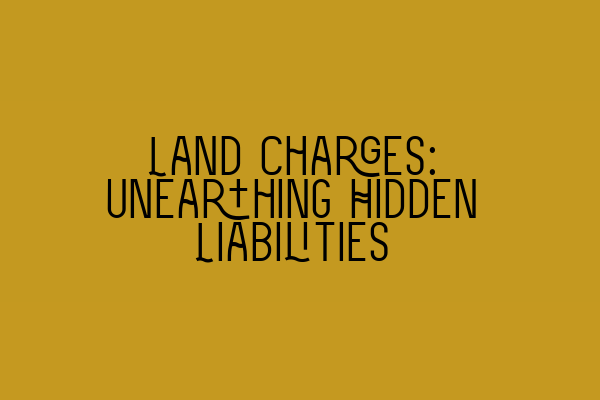Land Charges: Unearthing Hidden Liabilities
As a property owner or potential buyer, it’s essential to have a clear understanding of any liabilities associated with the land. Hidden liabilities can cause significant financial and legal problems in the future if not adequately addressed. One such area of concern is land charges.
What are Land Charges?
Land charges are legal interests or financial burdens that are registered against a property or a piece of land. These charges are designed to protect the interests of various parties, such as lenders, government bodies, and private individuals. They can have a significant impact on the land’s value and can affect its transferability.
Types of Land Charges
There are several types of land charges that you should be aware of as a property owner or buyer. These include:
1. Restrictive Covenants: Restrictive covenants are agreements that limit the use of the land or property. They can prevent you from making certain alterations or developments on the land. It’s crucial to understand the extent and implications of any restrictive covenants before purchasing a property.
2. Easements: Easements are rights that one party has over another’s land. They allow for the use or access to a specific part of the property. Common examples of easements include rights of way, drainage, and utility access. Easements can impact the use and enjoyment of the land, so it’s important to understand their existence and scope.
3. Mortgages: A mortgage is a type of land charge that secures the repayment of a loan used to purchase the property. It gives the lender a legal interest in the property, which can be enforced if the borrower defaults on the loan. It’s critical to assess any existing mortgages on a property to understand the financial liability associated with it.
4. Legal Notices: Legal notices, such as notices of bankruptcy or insolvency, can also be registered as land charges. These notices indicate that there may be financial or legal issues associated with the property owner or previous owners. They should be carefully examined to assess the potential risks involved.
The Importance of Unearthing Hidden Liabilities
Unearthing hidden land charges is crucial for property owners and buyers as they can have significant implications. Understanding the presence and extent of land charges will allow you to make informed decisions about the property’s purchase, use, and potential future developments. Failure to identify these hidden liabilities can lead to costly legal disputes, financial burdens, or restrictions on your property rights.
How to Unearth Hidden Land Charges
To uncover hidden land charges, it is essential to conduct thorough due diligence. This involves:
1. Title Search: Carry out a comprehensive title search to investigate the legal and financial history of the property. This search will reveal any existing land charges registered against the land. Consulting with a property law expert can help you interpret the information revealed in the title search.
2. Land Charges Register: Consult the Land Charges Register maintained by the Land Registry. This register contains details of various land charges, including restrictions, easements, mortgages, and other legal notices. Searching the Land Charges Register can provide valuable insights into the hidden liabilities associated with the land.
3. Legal Advice: Seek guidance from a solicitor specializing in property law to review the title search and land charges register. A solicitor’s expertise in this field will ensure that no hidden liabilities go unnoticed and that all necessary legal requirements are fulfilled.
Conclusion
Understanding and addressing hidden land charges is essential for property owners and buyers. Conducting thorough due diligence, including title searches, consulting the Land Charges Register, and seeking legal advice, can help unearth these hidden liabilities. By ensuring a clear understanding of any land charges, you can protect your interests, avoid legal disputes, and make informed decisions about the property. Take the time to do the necessary research and seek professional advice to safeguard your investment in property.
Related Articles:
– SQE 1 Practice Exam Questions
– SQE 1 Practice Mocks FLK1 FLK2
– SQE 2 Preparation Courses
– SQE 1 Preparation Courses
– SRA SQE Exam Dates
